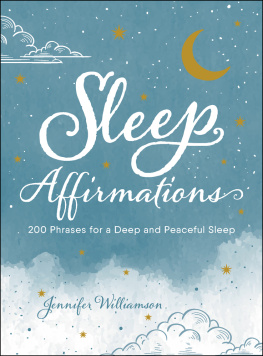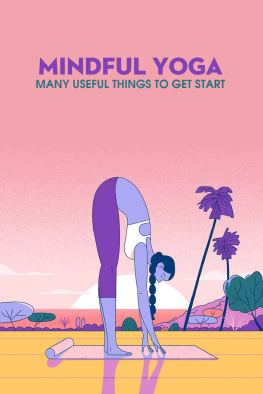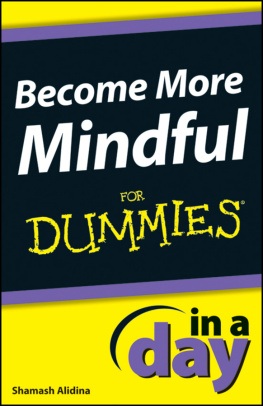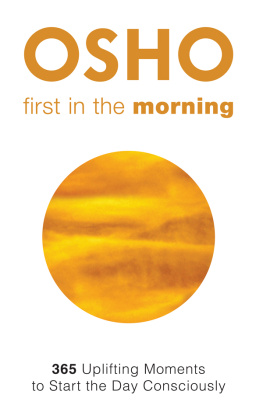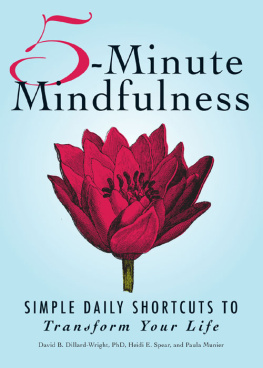Contents
Guide
A Mindful Morning
Start each day with a clear mind and open heart
David Dillard-Wright, PhD

Avon, Massachusetts
Copyright 2016 by F+W Media, Inc.
All rights reserved.
This book, or parts thereof, may not be reproduced in any form without permission from the publisher; exceptions are made for brief excerpts used in published reviews.
Published by
Adams Media, a division of F+W Media, Inc.
57 Littlefield Street, Avon, MA 02322. U.S.A.
www.adamsmedia.com
ISBN 10: 1-4405-9636-0
ISBN 13: 978-1-4405-9636-0
eISBN 10: 1-4405-9637-9
eISBN 13: 978-1-4405-9637-7
Library of Congress record available at http://lccn.loc.gov/2016007749 .
The information in this book should not be used for diagnosing or treating any health problem. Not all diet and exercise plans suit everyone. You should always consult a trained medical professional before starting a diet, taking any form of medication, or embarking on any fitness or weight-training program. The author and publisher disclaim any liability arising directly or indirectly from the use of this book.
Many of the designations used by manufacturers and sellers to distinguish their products are claimed as trademarks. Where those designations appear in this book and F+W Media, Inc. was aware of a trademark claim, the designations have been printed with initial capital letters.
Cover design by Stephanie Hannus.
Cover images 2004 Visual Language, iStockphoto.com/flas100, iStockphoto.com/beakraus, iStockphoto.com/CSA-Printstock, iStockphoto.com/katyau, iStockphoto.com/blueringmedia.
Interior images 2004 Visual Language, Nongnuch Leelaphasuk/123RF, David Methven Schrader/123RF, iStockphoto.com/macrovector, iStockphoto.com/Alioshin, iStockphoto.com/tomograf, iStockphoto.com/flas100, iStockphoto.com/123dartist, iStockphoto.com/elyaka, iStockphoto.com/nicoolay, iStockphoto.com/daboost, iStockphoto.com/Zenina, iStockphoto.com/aleksandarvelasevic, iStockphoto.com/duncan1890, iStockphoto.com/Slanapotam, iStockphoto.com/Craig McCausland, iStockphoto.com/katyau.
Per ardua
Introduction
In devotional Hinduism, the hours before dawn are thought to be among the most auspicious for meditation, as the veil between the divine and human worlds is the thinnest during these hours. The morning rituals serve as purification for the day to come, to set the mind on the right track. Taking a few moments in the morning to collect your thoughts and check in with your emotions can do wonders for your ability to manage and dismiss stress throughout the remainder of the day. The modern rituals of drinking coffee and reading the news also prepare the mind to face the challenges ahead, and these, too, can be met with mindfulness. Mindfulness, an intentional and steady embrace of the present moment, comes from within.
Few of us claim to be morning people, but perhaps we havent given ourselves permission to savor the early hours, to appreciate the light of a new sun. The reflections in A MindfulMorning come from a variety of world philosophies and religions, and they will help you start each day intentionally. These moments of centering will help take the sting out of the morning commute and pressing schedule by easing you calmly into your day. Over the course of this book, you will develop strong inner reserves that help you remain at peace despite the trials of our frantic society, so you can move throughout the day consciously and purposefully as your best and most authentic self.
You may think that you do not have time for mindfulness or meditation, but just think about how much time you spend reading random bits of news and Internet ephemera. Think about how much time you spend tweeting or going on Facebook, or playing Minecraft or Candy Crush. Think about the time that you spend sorting through mostly nonvital e-mail. Think about the stuff that you have to do: compiling reports for work, taking care of the kids, paying bills, buying groceries, doing the laundry: The list goes on and on. You deserve a break of a few minutes, several times a day, to collect yourself and put your mind in a calmer state. You deserve a break from the constant stream of noise and information.
I wrote this book thinking that you, dear reader, have lots of competing prioritiesthat you do not, in fact, live in a hermitage on top of a mountain. I imagine you sneaking a few minutes here and there to center yourself. I imagine you setting down your cell phone and finding that comfortable chair or reading nook. I see you lighting a stick of incense for a brief time of sacred silence. I see you at your desk or cubicle grabbing a minute or two to take some deep breaths and engage in thoughtful reading. Know that, wherever you are, you stand at the center of the struggle of the ages learning how to live a peaceful life in the midst of the hectic world. May you find a welcome respite in these pages.
But Im Not a Morning Person...
Most of us think of morning as time to be endured or rushed through quickly. We try to be as highly caffeinated as possible, to drop off the kids, to make the commute, and maybe catch the weather and the news along the way. Very few among us would confess to being a morning person, which sounds like a sort of mythical beast, the unicorn of the twenty-first century. Its not very cool to be a morning person. Confess to loving to wake up in the morning around the coffee pot at work and prepare yourself for scowls and murmurs. We think of morning people as Pollyanna types who whistle Zip-A-Dee-Doo-Dah on the way down the front walk, past the picket fence and the rose bushes, which, of course, they stop to smell. Get real. Who has time for that? Crack open a can of Red Bull and get in the f*#king car!
And so the day begins, with an aggressive cast of mind, with a heavy foot on the accelerator. When the morning hours are full of stress and anxiety, the rest of the day follows in that pattern. No wonder we seek to escape through entertainment. No wonder we medicate through junk food, prescriptions, and booze. But Im not here to preach or moralize. Rather, lets seek to understand the true nature of the problem and move beyond it.
We should probably start with sleep. According to A. Roger Ekirchs fascinating history At Days Close: Night in Times Past, staying up late at night didnt become very practical until the advent of electric lighting. All of those candles and oil lamps were expensive and apt to catch fire, so people generally went to bed much earlier. People in preindustrial societies largely slept in two sessions with a break in between. It was quite common to rise in the night and spend some time in quiet reflection, perhaps reading a book, saying prayers, or engaging in more (ahem!) carnal activity. Going to bed and rising were timed with the sun, which meant more sleep in winter and less sleep in summer. The watches of the night, those nocturnal waking hours, were like bonus free time. But night held more terrors like the fear of burglary or fire, which were both more common before streetlights. With electricity, we came untethered from the sun and could arrange our time accordingly. For many of us, this is simply convenient and has little downside. For others, like medical professionals and factory workers on the night shift, working at night means permanent disruption of sleep, with many mental and physical health side effects.
These days, we tend to sleep in one big block, rather than two smaller ones, but the size of the block gets smaller as the years go by. With our electronic devices and overabundance of entertainment, we sleep less. The Centers for Disease Control and Prevention (CDC) classifies insufficient sleep as a public health problem, with the lack of sleep interfering with work, hobbies, and basic safety on a massive scale. In 20052007, thirty percent of adults reported getting six hours or less sleep per night, a level of sleep deficit associated with higher levels of chronic disease and even increased mortality. In daily life, not getting enough sleep reduces concentration and memory, which means that nearly every task becomes more difficult. So perhaps the exercises in this book should begin with trying to get more sleep. Completing these little meditations probably requires going to bed a little bit earlier and rising a little bit earlier. Were not talking hours here: You can start with five to ten minutes, probably less time than you spend in the shower each morning.


